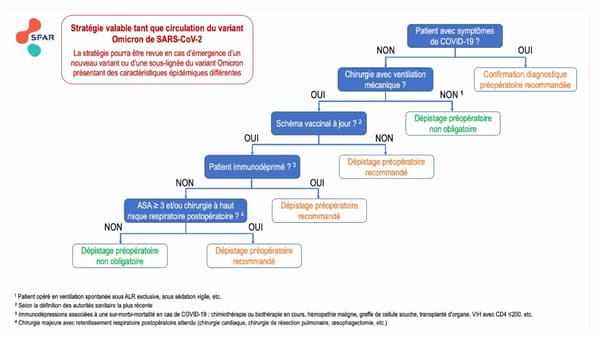Routine screening for Covid-19 before surgery is no longer recommended, he writes in a press release published Tuesday by the French Society of Anesthesia and Resuscitation (Sfar). He now recommends “a reduction in the preoperative screening strategy for COVID-19 for the least-risk patients.”
New recommendations have been issued due to “two significant epidemiological changes that occurred during the year 2022,” the organization writes.
Why this reduction?
On the one hand, the vaccination campaign against Covid-19 has made it possible to “reduce viral transmission and reduce clinical severity if, nevertheless, an infection is contracted.” On the other hand, Sfar highlights the “almost exclusive” circulation of the Omicron variant currently, which has “greater contagiousness” but is “responsible for less serious forms.”
In addition to avoiding Covid-19 contamination in the hospital, preoperative examinations prevent the patient from being at greater risk after surgery. In fact, several studies at the beginning of the Covid-19 epidemic have shown that “patients operated on early after COVID-19 are at higher risk of postoperative complications,” recalled Sfar in January 2022.
Therefore, a period of six weeks between the last positive test and the operation was recommended, except in cases where postponing the operation would represent too great a loss of opportunity for the patient.
But data from several studies on recent cases of infections underline an absence of “significant excess risk of postoperative respiratory morbidity for certain patients” who have developed a Covid-19 infection.
Not everyone is affected
However, some patients remain at risk and are not affected by these new recommendations, because a greater postoperative danger persists in case of contamination. Sfar thus cites symptomatic people at the time of surgery and those considered “at risk, such as the immunocompromised”, who are still recommended to perform screening tests for Covid-19 before surgery.

It is important to note that these are recommendations, not obligations, as they have been since the start of the pandemic. “An RT-PCR screening test, by nasopharyngeal swab, can actually be offered prior to any physician-decided scheduled hospitalization prior to medical intervention, but this is not national doctrine,” he told West of France the General Directorate of Health in August 2022.
Doctors can also adapt these rules depending on the cases found. Sfar reserves the right to modify its recommendations: this last strategy is only valid “as long as the Omicron variant (and its BA.2, BA.4 and BA.5 sublines) is the mostly circulating strain of SARS-CoV-2 in France “.
The organization also reminds that “only screening is changing, barrier measures are still in place and must be applied throughout the patient journey, from office to critical care.”
Source: BFM TV

